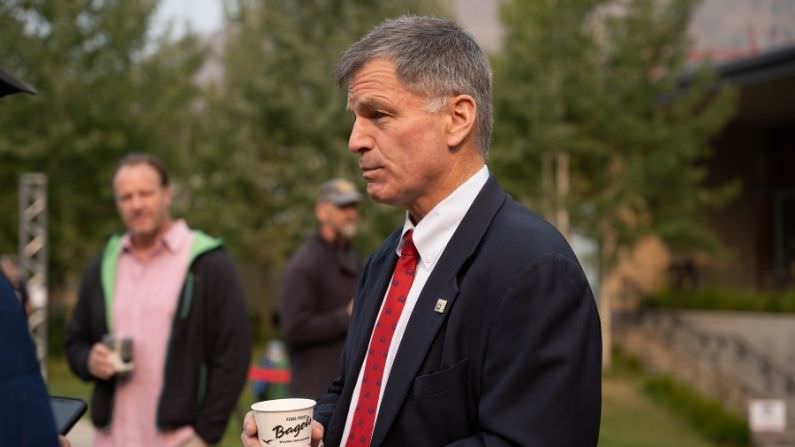Wyoming Gov. Mark Gordon held a public forum in Jackson on Aug. 31, during which he answered questions about the state’s COVID-19 response, climate change and tourism. But we wanted to talk more specifically about Teton County, so KHOL invited the governor into our studios to discuss the local housing crisis, income inequality and more.
The following interview has been lightly edited for brevity and clarity.
Will Walkey: Gov. Gordon, thank you so much for coming to KHOL. Thanks for coming to Teton County.
Gov. Mark Gordon: Oh, it’s wonderful to be here. Thanks so much.
Walkey: So, I’ll start by just asking about what, in my opinion, is the number one issue here in Teton County, which is housing. You know, it’s really hard for the local workforce to make it work here. A lot of times they have to commute from over in Idaho, or other counties, and it’s getting harder and harder because the real estate market is exploding so much. I’m curious if you have thoughts on how the state can help mitigate the housing crisis here in Teton County.
Gordon: Yeah, thanks. Thanks for that question. It’s certainly front and center. Not only in Teton—it’s most acute here, but it’s really across the state. So, one of the issues that I think we need to look at is how can we put more state resources behind this effort?
We were up here not long ago talking about some of those state land parcels. You know, there are some considerations about, can we do housing on those? Because we have snowplow drivers, teachers, game and fish personnel and others that can’t afford to live here. And so the question is, are there ways that we can figure out cheaper building parcels? Are there efforts that we can go to to help subsidize some of the living expenses?
And I think we have a couple of organizations that are really devoted to that. So one of them is the WCDA [Wyoming Community Development Authority]. What can we do to make sure that mission is more met by WCDA? It’s important not just for state workers and for service personnel. It’s also important because, as you have companies that move in, they want to have housing for their people that are coming with them. So, it’s a big issue.
Walkey: Thank you. Just a quick follow-up, which is that, you know, the federal government did set aside some money this past year for rental assistance for folks. And that hasn’t really been used up really very much in any state, but especially in Wyoming. I saw a stat that it’s less than 3% [that has been disbursed]. I’m curious if you have any thoughts on what the hold-up is and maybe how we can get some more money into folks’ hands, particularly here in Teton County, but also across the state?
Gordon: Yeah, well, Wyoming looked at this really in three distinct efforts. The one that I think you’re referencing was the early CARES [Coronavirus Aid, Relief, and Economic Security Act] money. And there, the legislature sort of built a facility that allowed for us to put some money out. I was very concerned because, you know, some of the people that are landlords are actually retirees that bought property just for income. So, evictions weren’t really the solution in that particular kind of scenario. So, that program had restrictions that we ran smack dab into.
We addressed those later in the year. We gave $15 million to all the counties to deploy really at the end of December. And some of that money came directly for rental assistance from charitable organizations that that money was delivered to. So, that was a real push-out and it kind of augments the money that we had still stored away from CARES. And now we have the ARPA funds. The American Recovery Plan [Act] funds. And that program will be—we’ve learned a lot. So, that program will be a little looser. So, we’ll continue to push that out.
Walkey: Next question, which is, again, about housing but slightly adjacent. I don’t know if you have been able to drive much around Jackson. One thing that you’d notice, and this is true across the state as well, is ‘Help wanted’ signs and businesses that have had to cut hours or even cut full services because they just can’t find enough staff for people. I’m curious if you have thoughts on what is holding back people from coming to work and how you’re trying to get people to go back to work, especially for our tourism economy here in Teton County.
Gordon: Well, your point, again, is very, very well taken. Wyoming really did not close down the way a number of other states did. And so we were able to kind of curtail our federal assistance programs for welfare early on. And the hope there was that we would get people sort of back and working. I think it had some success. But I think, as you say, nationwide, people are not coming back to work. And today I was talking about a presentation from BlackRock yesterday that was saying this is going to be a persistent issue going forward.
And one of the ways that people are going to have to address it is somehow with a technological solution. Now, I don’t know how you do that in a tourism industry where you need people to wait tables, wash dishes, you know, take reservations, make sure people get their cars parked, all that sort of stuff. So, I think we’re going to have to see people feel more comfortable coming back to work, which is why this COVID thing needs to be addressed. And then, hopefully, we start to see more and more people go.
I will tell you that one thing we did not do was have, you know, a come-back-to-work bonus. The reason we did that is because there were a lot of people that worked through the pandemic. So, why should we reward people who didn’t work differently than those who stayed on?
Walkey: Moving on slightly to another sort of unique Teton County issue, which is inequality. A recent Bloomberg report put Teton County once again as the most unequal county in the nation. State legislators have proposed a number of taxes that would put a little bit more burden onto the wealthiest individuals here in Teton County to help maybe balance the budget in the rest of the state. Is something that you’re open to?
Gordon: Well, I think the state’s going to have to look at its overall tax policy because so much of what we depend on is really under attack. Now, does that mean we want to raise taxes? You know, that’s a different question.
I really think that we’ve got to figure out what the exemptions are. If we’re properly assessing properties, we’ve got to make that transition kind of work well and slowly, because I know some of the businesses were shocked here in Teton County that their new assessed valuations were so high. And now you look at home prices, and look what’s going to happen there? So, that’s an ongoing conversation.
There is a lot of view around the state that, you know, ‘There’s only wealthy people living in Teton County. So, let’s figure out some way to shellac them,’ which I think is improper and doesn’t really work anyway because, you know, you’d end up with constitutional problems and a number of others.
But your point about inequality in Teton County is pretty profound. As you know, my wife has this Wyoming Hunger Initiative, and Teton County actually has some of the largest demand for sort of food assistance. It’s got the largest population of people who are food insecure. And we really, both as a state and I think Teton County, have to address that.
Walkey: Do you think that other state legislators, maybe in other parts of the state, might be open to some of these taxes? And do you think that you might try to push them in a certain way, given that, in a lot of ways, you know a lot about Teton County? Maybe more than some of the other legislators do in other parts of the state?
Gordon: Yeah, I think it’s a conversation we’re going to have. It’s a conversation that the legislature is having at this point. And I think it needs to really mature. It won’t happen—my sense is—it won’t happen this year because of the American Rescue Plan dollars that are coming in. So, we’re able to offset some of the general fund dollars with these recovery dollars. But I’m going to drive really hard to make sure over the next three, four years, which is really what that rescue plan money’s for, that we come to a better and more equitable and proper analysis of what our tax solutions ought to be. Now, Wyoming is—we are a low tax state. We are not going to raise taxes just willy nilly, but we need to figure out how we’re going to fund the enterprises we need.
Walkey: You talk about different issues that are going to keep coming up for you. One of those is clearly Medicaid expansion. And you’ve made your opinions on Medicaid expansion very well known. And you’ve stayed very, I would say, clear with how you feel about that. Has that changed in any way this summer?
Gordon: No. I was disappointed this year that the Senate did not get it to the floor. Clearly, the House, with a lot of courage, put forward Medicaid expansion. There was a good, robust discussion. It got stifled in the Senate. That’s politics. But in my view, I think that conversation needs to happen. Now, is Medicaid a solution? That’s another matter. But my biggest concern is what do we do about providing good medical care in Wyoming—and it’s a challenge—that can meet the needs of an aging population? That’s just another one of those things we’re going to have to contend with.
Walkey: Well, thank you, Gov. Gordon. Is there anything else that you think I’m missing here that you’d like to talk about, specifically about Teton County, given your time here?
Gordon: Well, Teton County, really, it’s interesting because it’s now one of the counties that actually helps fund schools elsewhere in the state. So, it’s a recapture district. Kind of a remarkable transition. So, I’m very hopeful that Wyoming will begin to appreciate all that Teton County not only does monetarily for it, but also with the attraction of the tourism. And as I said in my speech today, you know, one of the big challenges for us is how we get people to think about—Wyoming’s a big, beautiful state with lots of beautiful places. How do we spread this wealth a little bit better? So it’s not so, you know, focused on Grand Teton and Yellowstone [national parks] and Teton County, but really does take in a broader swath of the country.
Walkey: Absolutely. Well, thank you very much, Gov. Gordon, for taking the time to meet with me. And it was a pleasure talking to you and getting to know you. Thank you.
Gordon: Thank you very much.





